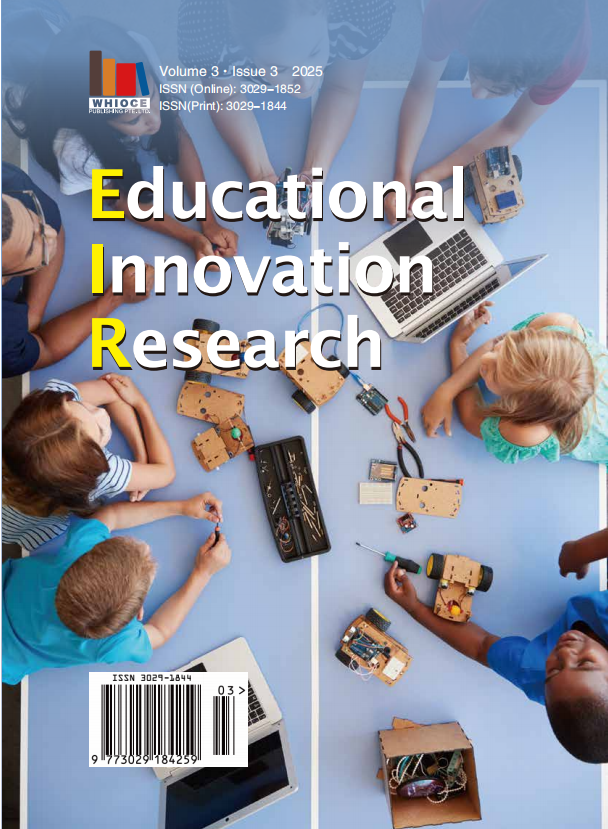Barriers to Effective Inclusive Education in Primary School in China: Perspectives from Teaching Practice
DOI:
https://doi.org/10.18063/eir.v3i3.845Keywords:
Inclusive education, Teaching practice, Primary school, InterviewsAbstract
Inclusive education is steadily developing and has achieved some results in China, but there are also many barriers, such as insufficient teacher capacity for inclusive education, insufficient school resource support, and difficulties in communicating with parents. These barriers are particularly evident in underdeveloped provinces, which constrain the development level of inclusive education in the local area and are detrimental to educational equity. This study conducted interviews with 15 teachers from 3 ordinary schools in Guizhou Province in China. Through thematic analysis, the results were obtained from three aspects: teaching practice, barriers faced, and solutions. In terms of teaching practice and the obstacles faced, there are significant problems such as insufficient level of inclusive education, insufficient personalized education, communication difficulties, inadequate management of behavioral norms, and lack of resources for teachers. Teachers overcome these obstacles through self-improvement, diversified teaching methods, emotional communication, and seeking external help, with good results.
References
UNESCO, 1994, Salamanca Declaration. Salamanca Declaration, 1994: 1–15.
Marton F, 1986, Phenomenography—A Research Approach to Investigating Different Understandings of Reality. Journal of Thought, 21(3): 28–49.
Chen J, Jiao J, 2020, A Review on the Current Situation of Special Education Teachers. Educational Observation, 9(37): 137–140.
Galkiene A, Monkeviciene O, 2021, Improving Inclusive Education Through Universal Design for Learning. Springer Nature, 5: 1–333.
Molina E, Pushparatnam A, Rimm-Kaufman S, 2018, Evidence-Based Teaching: Effective Teaching Practices in Primary School Classrooms. World Bank Policy Research Working Paper, 2018(8656): 1–65.
Qin GM, 2023, Research on the Application of Information Technology in Inclusive Education and Teaching. China Information Technology Education, 24: 84–87.
Braun V, Clarke V, 2006, Using Thematic Analysis in Psychology. Qualitative Research in Psychology, 3(2): 77–101.
Chen HX, Zhou Y, Lin JR, 2023, Research on the Application of Inclusive Education Classroom Teaching Strategies for Hearing-Impaired Students From the Perspective of Deep Learning. Chinese Journal of Hearing and Language Rehabilitation Science, 6: 572–574, 617.
Hu YC, Wu YY, Liu XW, 2021, Research on the Professional Competence and Assistance Needs of Teachers in Guangdong Special Education Schools in Developing Individualized Education Program. Modern Special Education, (24): 12–21.
Kozikoglu I, Albayrak EN, 2022, Teachers’ Attitudes and the Challenges They Experience Concerning Individualized Education Program (IEP): A Mixed Method Study. Participatory Educational Research, 9(1): 98–115.
Li X, 2024, Investigation and Research on the Implementation Status of Individualized Education Program for Special Students in Ordinary Schools in Sichuan Province. Journal of Leshan Normal University, 39(10): 127–134.
Liu X, 2024, Exploration of Teaching Strategies for Special Needs Children in Inclusive Education Perspective. Read, Write and Calculate, 17: 146–148.
Meng SC, 2023, A Study on the Quality of Inclusive Classroom Practices and Its Related Factors in Shanghai Preschools—Based on Inclusive Classroom Profile, thesis, East China Normal University.
Wang H, 2024, Reflection and Practice on the Effective Application of Individualized Education Programs in Inclusive Education. Modern Special Education, 17: 19–21.
Zhang HW, Zhao B, 2022, Research on the Development of Inclusive Education in China From a Policy Driven Perspective. Modern Special Education, 2: 7–14.

